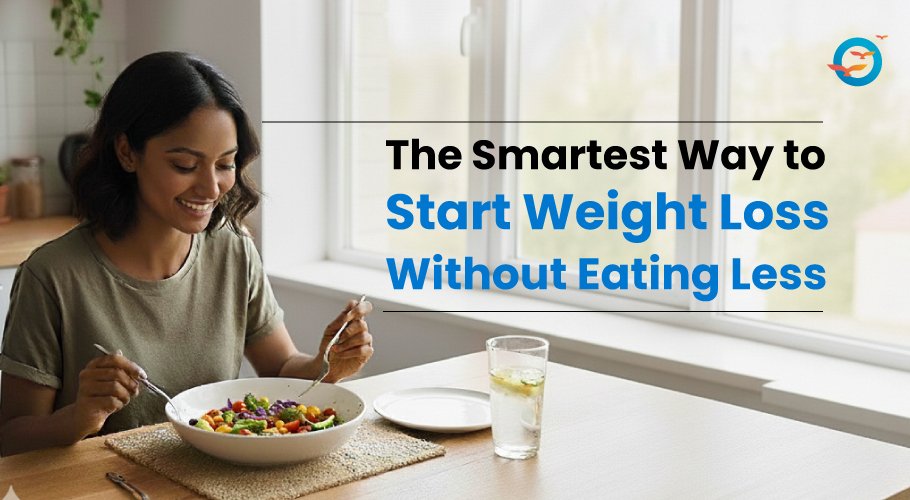
What Is the Smartest Way to Start Losing Weight Without Eating Less?
Many people believe weight loss happens only when you reduce food intake. But the truth is very different. You can continue gaining weight even while eating less, and this often feels confusing and frustrating. The real reason behind this struggle is not your willpower or your discipline. It is a deeper hormonal miscommunication happening inside your body. Two important hormones, insulin and leptin, control appetite, fat storage, and hunger, and when they stop working properly, weight gain becomes almost automatic. This imbalance usually begins not because of overeating, but because of repeated exposure to high-energy foods without you even realizing it.
Why Do You Gain Weight Even When You Are Eating Less?
Most people who are trying to lose weight reduce portions, avoid certain foods, skip meals, or follow strict diets. Yet the weighing scale barely moves, or in some cases, weight continues to increase. This happens because your hormones decide your fat storage much before calories do. High-energy foods like creamy gravies, fried snacks, café beverages, and heavy meals push insulin up suddenly. When insulin rises frequently, the body stays in fat-storage mode throughout the day. At the same time, leptin, the hormone responsible for sending “I am full” signals to your brain, stops working correctly. This creates constant hunger even when you are not eating much. So the problem is not food quantity. The problem is the energy density of the food.
Does Weight Gain Begin in the Mind Before It Happens in the Body?
Before you eat anything, your mind decides how the body will react to that food. People with diabetes look at food and immediately think about sugar levels. People with kidney disease automatically think about protein content. But someone dealing with stubborn weight gain needs a different approach. You must train your mind to ask one simple question before eating: Is this food high-energy or low-energy? This question is more powerful than counting calories or restricting diet. The moment your mind learns to classify food this way, your hormones start responding differently. This awareness alone becomes the first step toward natural, effortless fat loss.
How Should You Classify Foods for Easy Weight Loss?
Instead of focusing on protein, carbohydrates or fats in the beginning, start by dividing foods into two broad groups. One group contains foods that do not overload the body with energy and help control insulin and leptin. The other group contains foods that quickly push the body into fat-storage mode. Clear soups, black coffee without milk, cucumber, simple salads, steamed vegetables, and vegetable smoothies without fruit belong to the low-energy category. These foods help your body stay calm, reduce hunger naturally, and support fat burning. On the other hand, dishes like dal-rice with ghee, paneer tikka, parathas, restaurant gravies, creamy beverages, desserts and fried snacks belong to the high-energy category. These foods activate hunger hormones and create a continuous cycle of cravings and fat storage.
Why Do Insulin and Leptin Decide Your Weight?
Every time you eat a high-energy meal, insulin levels rise sharply. High insulin means the body stops burning fat and begins storing it. Even worse, hunger stays active for a longer time. Meanwhile, as body fat increases, leptin is produced in larger amounts. Leptin’s job is to tell your brain that the body already has enough stored energy. But when leptin levels remain high all the time, the brain stops responding to the signal. This condition is called leptin resistance. It makes you feel hungry frequently, even when you are not truly hungry. So weight loss becomes extremely difficult because the hormonal system keeps pushing you to eat more and store more.
When Does Fat Loss Begin Automatically Without Hunger or Struggle?
Fat loss becomes automatic when your exposure to high-energy foods reduces. When you slowly shift toward lighter, low-energy foods, insulin levels drop to a healthier range. As insulin settles, leptin begins to communicate with your brain correctly again. Once this hormonal correction begins, something remarkable happens. Your natural hunger reduces. Cravings drop. You don’t feel the urge to overeat. You eat because your body needs fuel, not because your hormones are forcing you. This is the stage where fat loss begins without dieting, without stress, and without feeling deprived.
How Can You Start This Shift From Today?
You can begin with simple changes that train your mind and body. Start each lunch or dinner with low-energy food such as cucumber, salad or clear soup. This calms your hunger before the main meal. Reduce the size of your plate just a little rather than cutting portions drastically. When eating outside, avoid large or family-sized portions because they hide extra calories. If you choose protein outside, select dry preparations that do not contain creamy gravies or excess oil. Drink water regularly because thirst often feels like hunger and makes you eat unnecessarily. These small, practical habits help reset your hormonal signals one meal at a time.
What Is the Real Goal of Smart Weight Loss?
Your goal is not to starve or punish your body. Your goal is to change your exposure to high-energy foods. Once your brain learns to see food clearly and your hormones begin correcting naturally, weight loss stops being a battle. It becomes a smooth, automatic and permanent process. You no longer fight against your body. Instead, your biology starts working in your favor.
https://www.freedomfromdiabetes.org/blog/post/best-way-to-lose-weight-without-eating-less/4909

